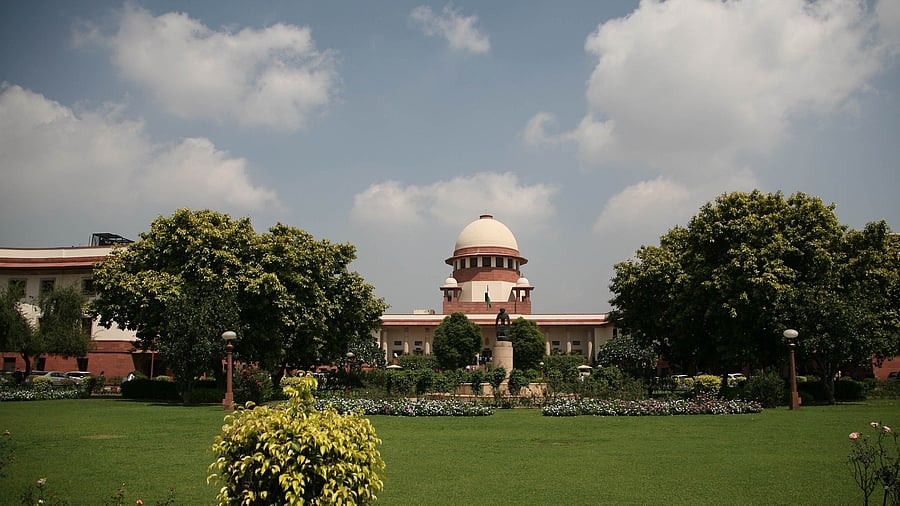
Supreme Court
Credit: iStock Photo
New Delhi: The Uttar Pradesh government on Monday told the Supreme Court that it is amending laws to shed the colonial mindset of conferring ex-officio positions in cooperative societies and trusts to the spouses or family members of the state bureaucrats.
A bench of Justices Surya Kant and N Kotiswar Singh was told by Additional Solicitor General KM Nataraj, appearing for the Uttar Pradesh government that model rules are being formulated to regulate these cooperative societies, societies and trusts which are receiving direct or indirect funding from the state.
"We are shedding the colonial mindset where wives of bureaucrats are appointed as ex-officio positions in these societies and trusts. Model by-laws are in the pipeline," he told the bench.
The top court was hearing a plea related to a dispute over control of Bulandshahr's Zila Mahila Samiti which has been functioning since 1957 in Uttar Pradesh over a piece of land.
Meanwhile, counsel for the wife of a former district magistrate of Bulandshahr, who was at the Centre of the dispute for being made "patron" of the samiti, sought withdrawal of her name as her husband had been transferred to some other position.
The bench directed her to return all the relevant records including the accounts books of the samiti in her possession.
It also directed that registration of the samiti, which is due to lapse by March 7, shall not be cancelled.
The bench posted the matter for further hearing after four weeks.
On December 2, last year, the top court asked the Uttar Pradesh government and its authorities to formulate and propose suitable amendments in the State Cooperative Societies Act, State Societies Registration Act or any other statute whereunder the cooperative societies, societies, trusts or other such legal entities are registered.
"The amended law can put such legal entities, if they are getting direct or indirect financial aid/assistance from the state, under an obligation to follow the model by-laws/rules/regulations to be circulated by the state government.
"In the event of non-compliance or defiance of such model by-laws/rules/regulations, the society can be made to lose its legal character as well as government assistance," the bench had said.
It had directed the state government to prepare the draft proposal and put it up before the court for consideration.
"The amended provisions will have to ensure that the by-laws/rules or regulations of society will shed the colonial mindset of conferring ex officio positions to the spouse or family members of the State bureaucrats.
"It is, of course, for the legislature to bring the suitable amendment and introduce such a structure of the governing body of a society or trust, which leans towards democratic values where most of the members are duly elected," it had said.
The top court had taken a dim view of a situation where the wives of top bureaucrats like chief secretaries and district magistrates held ex-officio posts in several Uttar Pradesh's cooperative societies and trusts.
The Zila Samiti was given "nazul" land (land parcel leased by the government) by the district administration to work for the welfare of widows, orphans and other marginalised sections of women.
While the original by-laws required the wife of the officiating DM of Bulandshahr district to act as the president, the samiti tried to amend the by-laws in 2022, making the DM’s wife a "patron" to the society instead of its president.
The deputy registrar, however, annulled the amendments on several grounds, which was challenged before the Allahabad High Court, which rejected the samiti's plea.
Aggrieved by the high court's order, the samiti moved the apex court.
The top court had earlier allowed the samiti to continue to work as usual but restrained the DM's wife from being the office bearer or interfering with the work of the cooperative society.
It directed the petitioner society not to create any encumbrance or any third-party rights on the "nazul" land or any other property that was entrusted to it by the state directly or indirectly.
On May 6, last year, the top court pulled up the state government for approving the peculiar regulation mandating the wife of the DM of Bulandshahr to serve as president of registered societies in the district and termed it as "atrocious" and "humiliating for all women in the state".
"Be it the Red Cross Society or a child welfare society, everywhere the wife of the officiating DM is the president. Why does this have to be done?" the top court had asked.
It had questioned the state government over the rationale behind making such a person head of a society, not on leadership skills or community spirit, but by their marital association.